Student Perspectives on the Future Job Market in the Age of Automation
VerifiedAdded on 2023/06/13
|10
|2858
|151
Report
AI Summary
This report presents a qualitative study exploring University of Bath students' perspectives on the future job market in light of increasing automation and the potential for robots to replace human workers. The research employs interviews with students, analyzed using thematic analysis, to understand their views on potential work and life scenarios in 2050, the ways in which robots could assist humans, their impressions of the future based on films, and their concerns about job displacement. The findings suggest that students hold mixed views, with some expressing concerns about job losses and the potential for a widening gap between highly skilled and low-skilled workers, while others see opportunities for increased productivity and the creation of new jobs. The study concludes that robots will significantly impact the job market, potentially leading to widespread joblessness or displacement into lower-paying service industry jobs, highlighting the need for proactive adaptation in education and political and financial institutions. Desklib offers this assignment solution along with a wealth of resources, including past papers and solved assignments, to support students in their academic endeavors.

INDIVIDUAL SMALL RESEARCH
PROJECT
PROJECT
Paraphrase This Document
Need a fresh take? Get an instant paraphrase of this document with our AI Paraphraser
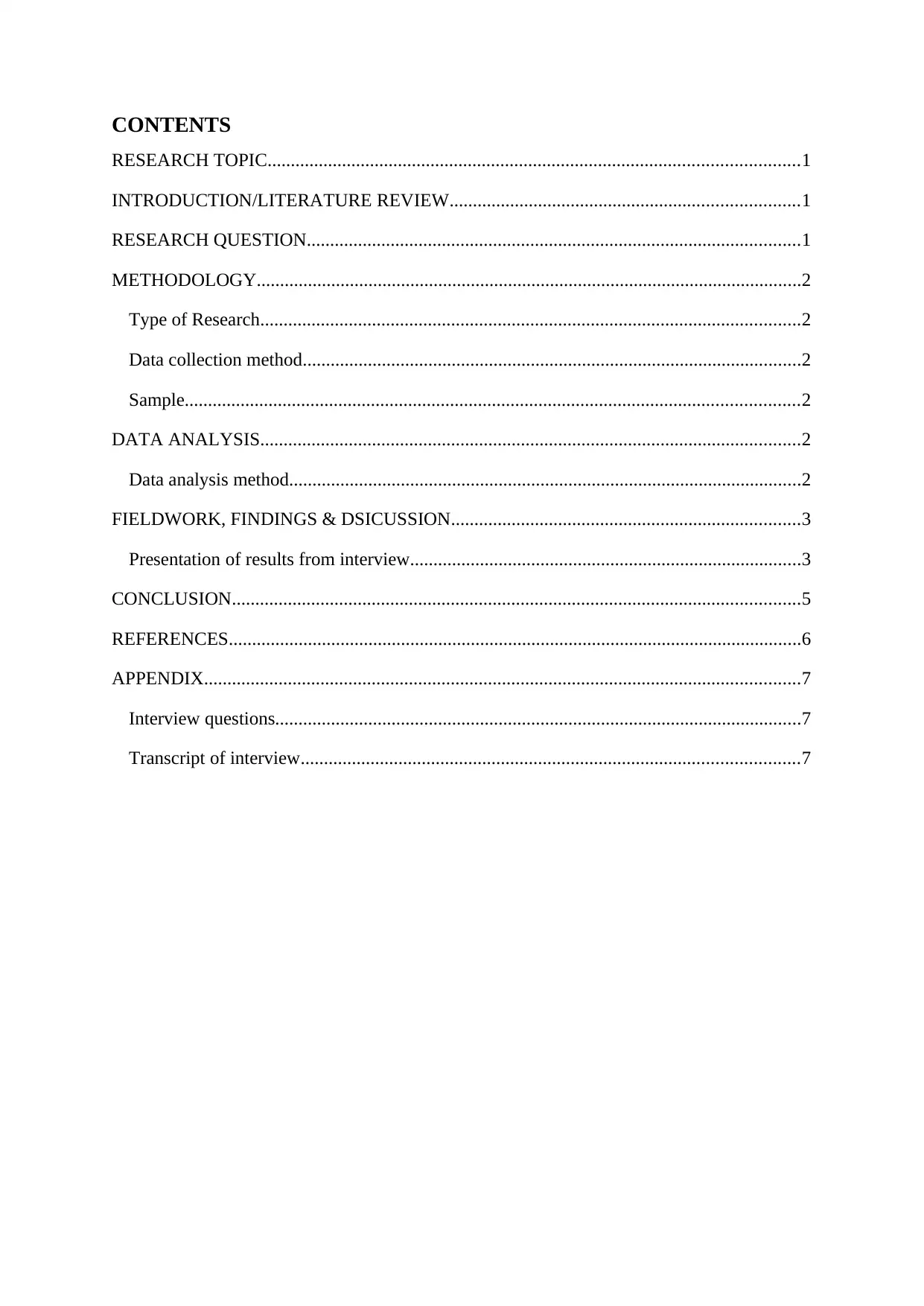
CONTENTS
RESEARCH TOPIC..................................................................................................................1
INTRODUCTION/LITERATURE REVIEW...........................................................................1
RESEARCH QUESTION..........................................................................................................1
METHODOLOGY.....................................................................................................................2
Type of Research....................................................................................................................2
Data collection method...........................................................................................................2
Sample....................................................................................................................................2
DATA ANALYSIS....................................................................................................................2
Data analysis method..............................................................................................................2
FIELDWORK, FINDINGS & DSICUSSION...........................................................................3
Presentation of results from interview....................................................................................3
CONCLUSION..........................................................................................................................5
REFERENCES...........................................................................................................................6
APPENDIX................................................................................................................................7
Interview questions.................................................................................................................7
Transcript of interview...........................................................................................................7
RESEARCH TOPIC..................................................................................................................1
INTRODUCTION/LITERATURE REVIEW...........................................................................1
RESEARCH QUESTION..........................................................................................................1
METHODOLOGY.....................................................................................................................2
Type of Research....................................................................................................................2
Data collection method...........................................................................................................2
Sample....................................................................................................................................2
DATA ANALYSIS....................................................................................................................2
Data analysis method..............................................................................................................2
FIELDWORK, FINDINGS & DSICUSSION...........................................................................3
Presentation of results from interview....................................................................................3
CONCLUSION..........................................................................................................................5
REFERENCES...........................................................................................................................6
APPENDIX................................................................................................................................7
Interview questions.................................................................................................................7
Transcript of interview...........................................................................................................7
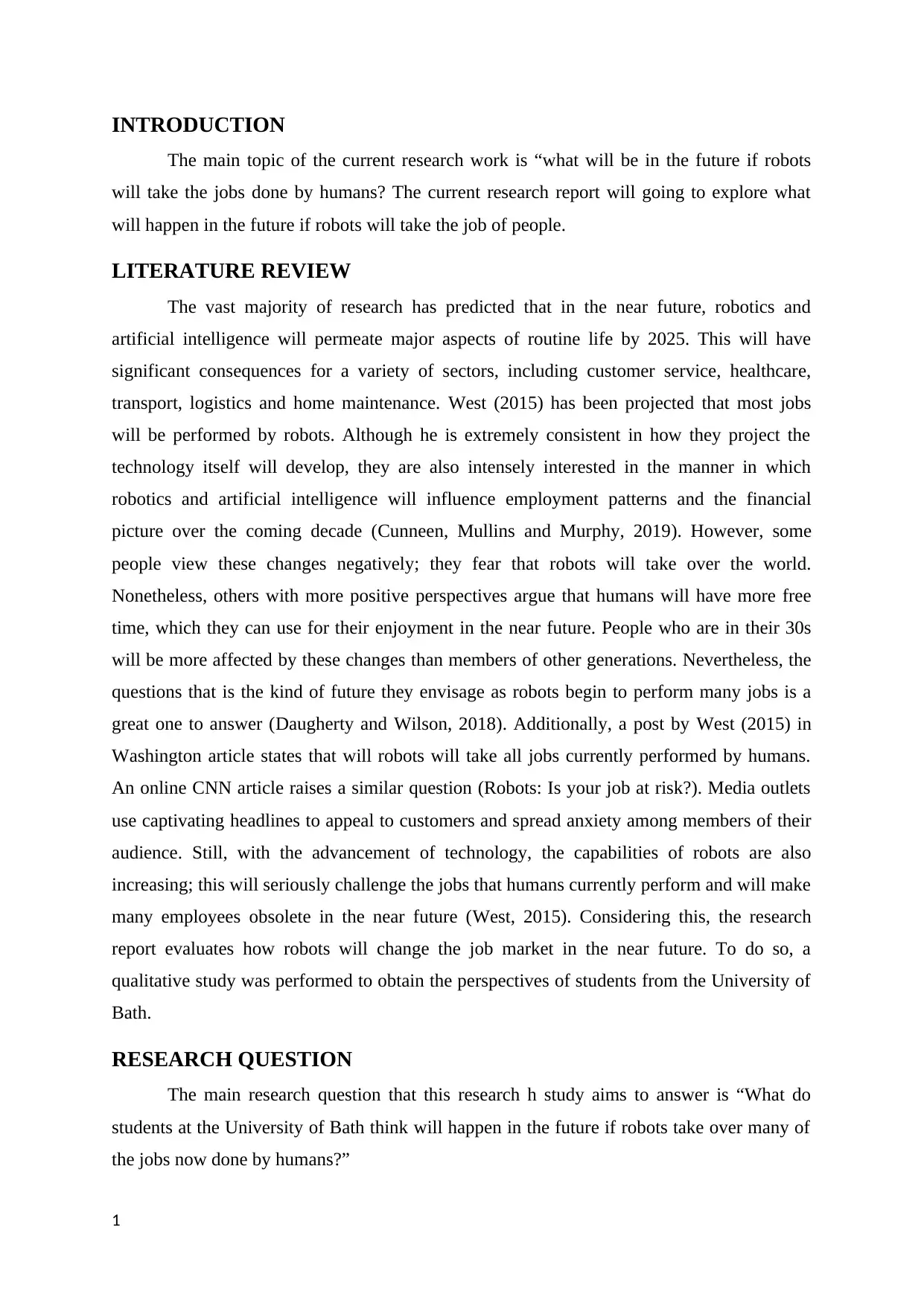
INTRODUCTION
The main topic of the current research work is “what will be in the future if robots
will take the jobs done by humans? The current research report will going to explore what
will happen in the future if robots will take the job of people.
LITERATURE REVIEW
The vast majority of research has predicted that in the near future, robotics and
artificial intelligence will permeate major aspects of routine life by 2025. This will have
significant consequences for a variety of sectors, including customer service, healthcare,
transport, logistics and home maintenance. West (2015) has been projected that most jobs
will be performed by robots. Although he is extremely consistent in how they project the
technology itself will develop, they are also intensely interested in the manner in which
robotics and artificial intelligence will influence employment patterns and the financial
picture over the coming decade (Cunneen, Mullins and Murphy, 2019). However, some
people view these changes negatively; they fear that robots will take over the world.
Nonetheless, others with more positive perspectives argue that humans will have more free
time, which they can use for their enjoyment in the near future. People who are in their 30s
will be more affected by these changes than members of other generations. Nevertheless, the
questions that is the kind of future they envisage as robots begin to perform many jobs is a
great one to answer (Daugherty and Wilson, 2018). Additionally, a post by West (2015) in
Washington article states that will robots will take all jobs currently performed by humans.
An online CNN article raises a similar question (Robots: Is your job at risk?). Media outlets
use captivating headlines to appeal to customers and spread anxiety among members of their
audience. Still, with the advancement of technology, the capabilities of robots are also
increasing; this will seriously challenge the jobs that humans currently perform and will make
many employees obsolete in the near future (West, 2015). Considering this, the research
report evaluates how robots will change the job market in the near future. To do so, a
qualitative study was performed to obtain the perspectives of students from the University of
Bath.
RESEARCH QUESTION
The main research question that this research h study aims to answer is “What do
students at the University of Bath think will happen in the future if robots take over many of
the jobs now done by humans?”
1
The main topic of the current research work is “what will be in the future if robots
will take the jobs done by humans? The current research report will going to explore what
will happen in the future if robots will take the job of people.
LITERATURE REVIEW
The vast majority of research has predicted that in the near future, robotics and
artificial intelligence will permeate major aspects of routine life by 2025. This will have
significant consequences for a variety of sectors, including customer service, healthcare,
transport, logistics and home maintenance. West (2015) has been projected that most jobs
will be performed by robots. Although he is extremely consistent in how they project the
technology itself will develop, they are also intensely interested in the manner in which
robotics and artificial intelligence will influence employment patterns and the financial
picture over the coming decade (Cunneen, Mullins and Murphy, 2019). However, some
people view these changes negatively; they fear that robots will take over the world.
Nonetheless, others with more positive perspectives argue that humans will have more free
time, which they can use for their enjoyment in the near future. People who are in their 30s
will be more affected by these changes than members of other generations. Nevertheless, the
questions that is the kind of future they envisage as robots begin to perform many jobs is a
great one to answer (Daugherty and Wilson, 2018). Additionally, a post by West (2015) in
Washington article states that will robots will take all jobs currently performed by humans.
An online CNN article raises a similar question (Robots: Is your job at risk?). Media outlets
use captivating headlines to appeal to customers and spread anxiety among members of their
audience. Still, with the advancement of technology, the capabilities of robots are also
increasing; this will seriously challenge the jobs that humans currently perform and will make
many employees obsolete in the near future (West, 2015). Considering this, the research
report evaluates how robots will change the job market in the near future. To do so, a
qualitative study was performed to obtain the perspectives of students from the University of
Bath.
RESEARCH QUESTION
The main research question that this research h study aims to answer is “What do
students at the University of Bath think will happen in the future if robots take over many of
the jobs now done by humans?”
1
⊘ This is a preview!⊘
Do you want full access?
Subscribe today to unlock all pages.

Trusted by 1+ million students worldwide
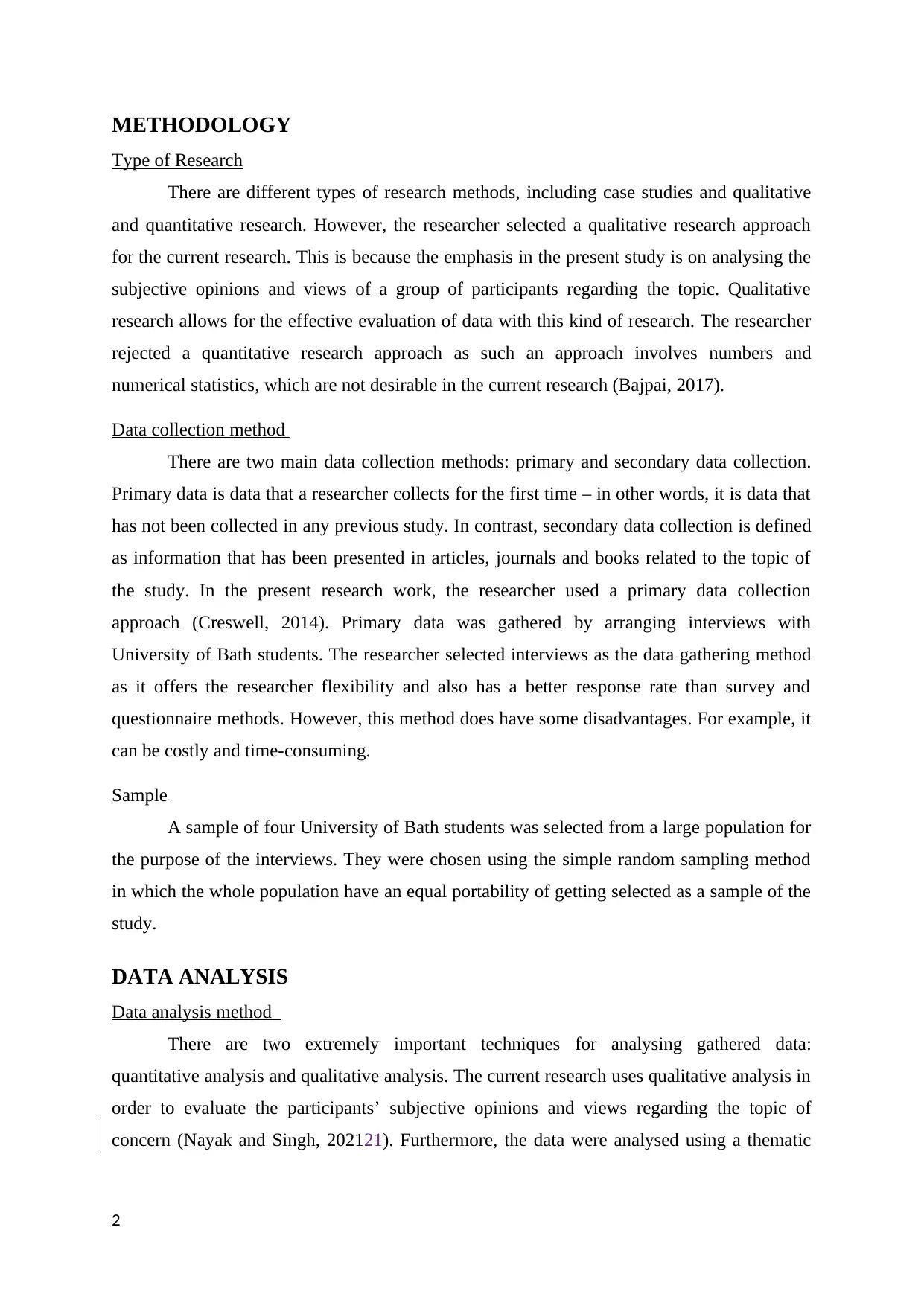
METHODOLOGY
Type of Research
There are different types of research methods, including case studies and qualitative
and quantitative research. However, the researcher selected a qualitative research approach
for the current research. This is because the emphasis in the present study is on analysing the
subjective opinions and views of a group of participants regarding the topic. Qualitative
research allows for the effective evaluation of data with this kind of research. The researcher
rejected a quantitative research approach as such an approach involves numbers and
numerical statistics, which are not desirable in the current research (Bajpai, 2017).
Data collection method
There are two main data collection methods: primary and secondary data collection.
Primary data is data that a researcher collects for the first time – in other words, it is data that
has not been collected in any previous study. In contrast, secondary data collection is defined
as information that has been presented in articles, journals and books related to the topic of
the study. In the present research work, the researcher used a primary data collection
approach (Creswell, 2014). Primary data was gathered by arranging interviews with
University of Bath students. The researcher selected interviews as the data gathering method
as it offers the researcher flexibility and also has a better response rate than survey and
questionnaire methods. However, this method does have some disadvantages. For example, it
can be costly and time-consuming.
Sample
A sample of four University of Bath students was selected from a large population for
the purpose of the interviews. They were chosen using the simple random sampling method
in which the whole population have an equal portability of getting selected as a sample of the
study.
DATA ANALYSIS
Data analysis method
There are two extremely important techniques for analysing gathered data:
quantitative analysis and qualitative analysis. The current research uses qualitative analysis in
order to evaluate the participants’ subjective opinions and views regarding the topic of
concern (Nayak and Singh, 202121). Furthermore, the data were analysed using a thematic
2
Type of Research
There are different types of research methods, including case studies and qualitative
and quantitative research. However, the researcher selected a qualitative research approach
for the current research. This is because the emphasis in the present study is on analysing the
subjective opinions and views of a group of participants regarding the topic. Qualitative
research allows for the effective evaluation of data with this kind of research. The researcher
rejected a quantitative research approach as such an approach involves numbers and
numerical statistics, which are not desirable in the current research (Bajpai, 2017).
Data collection method
There are two main data collection methods: primary and secondary data collection.
Primary data is data that a researcher collects for the first time – in other words, it is data that
has not been collected in any previous study. In contrast, secondary data collection is defined
as information that has been presented in articles, journals and books related to the topic of
the study. In the present research work, the researcher used a primary data collection
approach (Creswell, 2014). Primary data was gathered by arranging interviews with
University of Bath students. The researcher selected interviews as the data gathering method
as it offers the researcher flexibility and also has a better response rate than survey and
questionnaire methods. However, this method does have some disadvantages. For example, it
can be costly and time-consuming.
Sample
A sample of four University of Bath students was selected from a large population for
the purpose of the interviews. They were chosen using the simple random sampling method
in which the whole population have an equal portability of getting selected as a sample of the
study.
DATA ANALYSIS
Data analysis method
There are two extremely important techniques for analysing gathered data:
quantitative analysis and qualitative analysis. The current research uses qualitative analysis in
order to evaluate the participants’ subjective opinions and views regarding the topic of
concern (Nayak and Singh, 202121). Furthermore, the data were analysed using a thematic
2
Paraphrase This Document
Need a fresh take? Get an instant paraphrase of this document with our AI Paraphraser
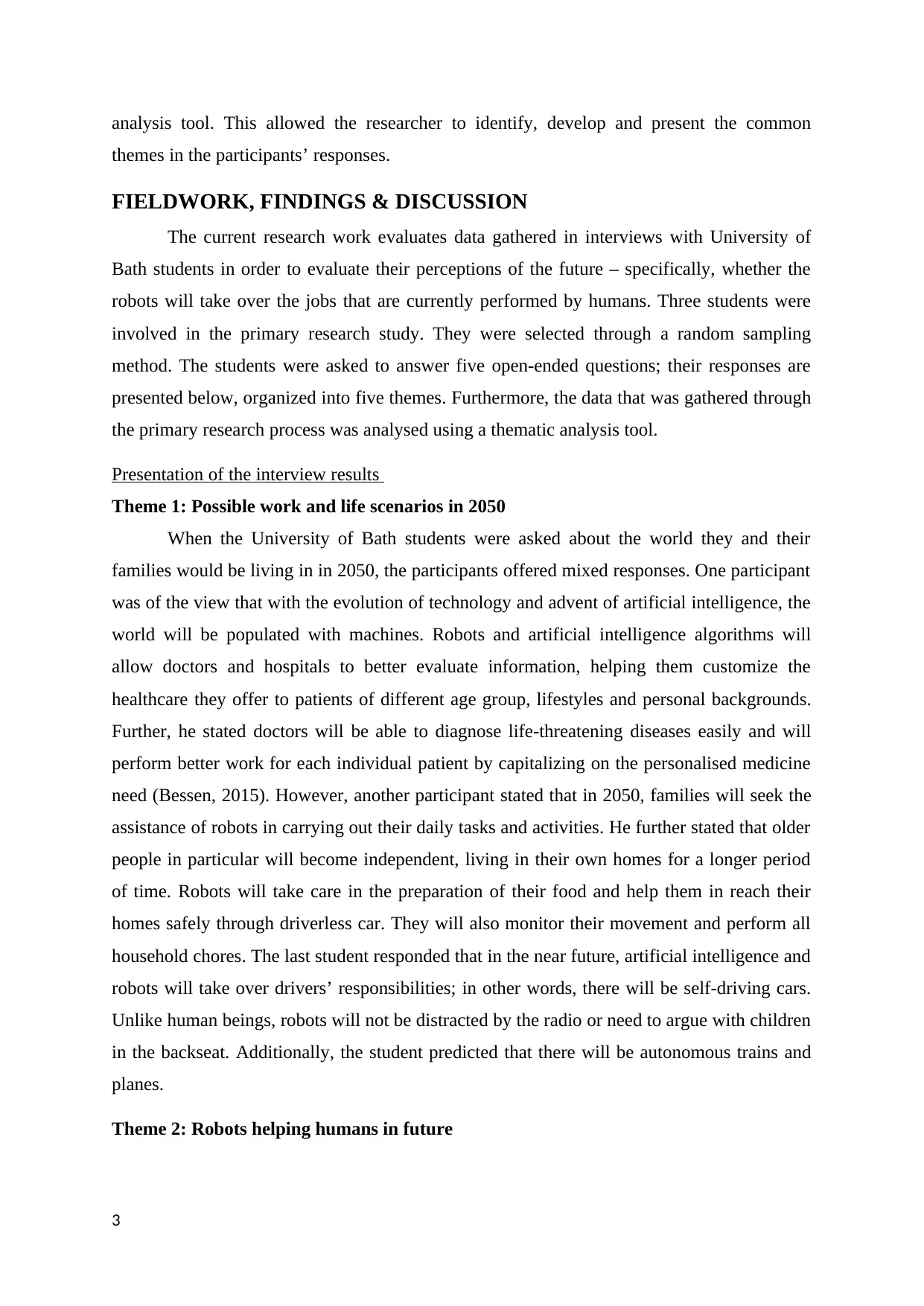
analysis tool. This allowed the researcher to identify, develop and present the common
themes in the participants’ responses.
FIELDWORK, FINDINGS & DISCUSSION
The current research work evaluates data gathered in interviews with University of
Bath students in order to evaluate their perceptions of the future – specifically, whether the
robots will take over the jobs that are currently performed by humans. Three students were
involved in the primary research study. They were selected through a random sampling
method. The students were asked to answer five open-ended questions; their responses are
presented below, organized into five themes. Furthermore, the data that was gathered through
the primary research process was analysed using a thematic analysis tool.
Presentation of the interview results
Theme 1: Possible work and life scenarios in 2050
When the University of Bath students were asked about the world they and their
families would be living in in 2050, the participants offered mixed responses. One participant
was of the view that with the evolution of technology and advent of artificial intelligence, the
world will be populated with machines. Robots and artificial intelligence algorithms will
allow doctors and hospitals to better evaluate information, helping them customize the
healthcare they offer to patients of different age group, lifestyles and personal backgrounds.
Further, he stated doctors will be able to diagnose life-threatening diseases easily and will
perform better work for each individual patient by capitalizing on the personalised medicine
need (Bessen, 2015). However, another participant stated that in 2050, families will seek the
assistance of robots in carrying out their daily tasks and activities. He further stated that older
people in particular will become independent, living in their own homes for a longer period
of time. Robots will take care in the preparation of their food and help them in reach their
homes safely through driverless car. They will also monitor their movement and perform all
household chores. The last student responded that in the near future, artificial intelligence and
robots will take over drivers’ responsibilities; in other words, there will be self-driving cars.
Unlike human beings, robots will not be distracted by the radio or need to argue with children
in the backseat. Additionally, the student predicted that there will be autonomous trains and
planes.
Theme 2: Robots helping humans in future
3
themes in the participants’ responses.
FIELDWORK, FINDINGS & DISCUSSION
The current research work evaluates data gathered in interviews with University of
Bath students in order to evaluate their perceptions of the future – specifically, whether the
robots will take over the jobs that are currently performed by humans. Three students were
involved in the primary research study. They were selected through a random sampling
method. The students were asked to answer five open-ended questions; their responses are
presented below, organized into five themes. Furthermore, the data that was gathered through
the primary research process was analysed using a thematic analysis tool.
Presentation of the interview results
Theme 1: Possible work and life scenarios in 2050
When the University of Bath students were asked about the world they and their
families would be living in in 2050, the participants offered mixed responses. One participant
was of the view that with the evolution of technology and advent of artificial intelligence, the
world will be populated with machines. Robots and artificial intelligence algorithms will
allow doctors and hospitals to better evaluate information, helping them customize the
healthcare they offer to patients of different age group, lifestyles and personal backgrounds.
Further, he stated doctors will be able to diagnose life-threatening diseases easily and will
perform better work for each individual patient by capitalizing on the personalised medicine
need (Bessen, 2015). However, another participant stated that in 2050, families will seek the
assistance of robots in carrying out their daily tasks and activities. He further stated that older
people in particular will become independent, living in their own homes for a longer period
of time. Robots will take care in the preparation of their food and help them in reach their
homes safely through driverless car. They will also monitor their movement and perform all
household chores. The last student responded that in the near future, artificial intelligence and
robots will take over drivers’ responsibilities; in other words, there will be self-driving cars.
Unlike human beings, robots will not be distracted by the radio or need to argue with children
in the backseat. Additionally, the student predicted that there will be autonomous trains and
planes.
Theme 2: Robots helping humans in future
3
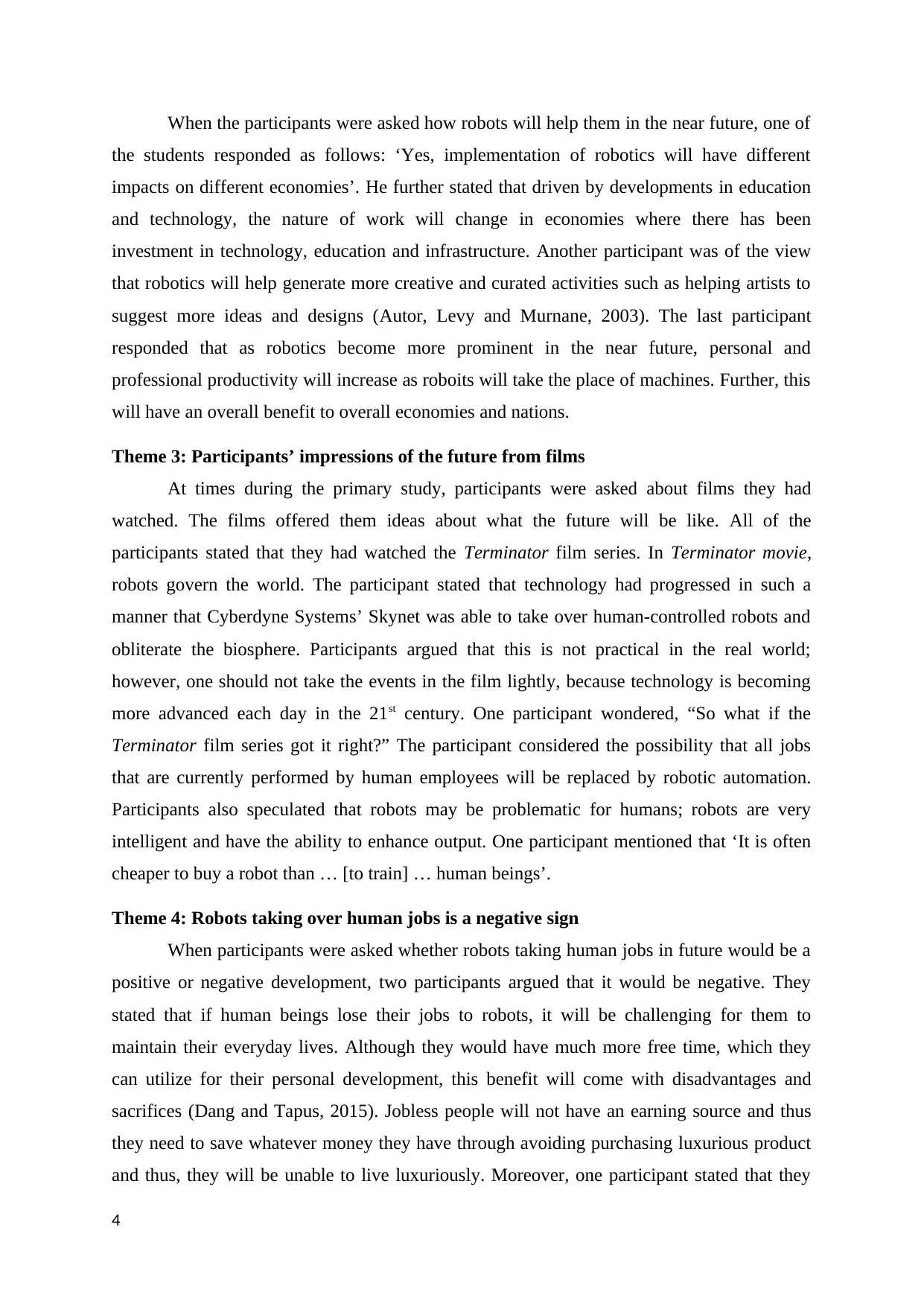
When the participants were asked how robots will help them in the near future, one of
the students responded as follows: ‘Yes, implementation of robotics will have different
impacts on different economies’. He further stated that driven by developments in education
and technology, the nature of work will change in economies where there has been
investment in technology, education and infrastructure. Another participant was of the view
that robotics will help generate more creative and curated activities such as helping artists to
suggest more ideas and designs (Autor, Levy and Murnane, 2003). The last participant
responded that as robotics become more prominent in the near future, personal and
professional productivity will increase as roboits will take the place of machines. Further, this
will have an overall benefit to overall economies and nations.
Theme 3: Participants’ impressions of the future from films
At times during the primary study, participants were asked about films they had
watched. The films offered them ideas about what the future will be like. All of the
participants stated that they had watched the Terminator film series. In Terminator movie,
robots govern the world. The participant stated that technology had progressed in such a
manner that Cyberdyne Systems’ Skynet was able to take over human-controlled robots and
obliterate the biosphere. Participants argued that this is not practical in the real world;
however, one should not take the events in the film lightly, because technology is becoming
more advanced each day in the 21st century. One participant wondered, “So what if the
Terminator film series got it right?” The participant considered the possibility that all jobs
that are currently performed by human employees will be replaced by robotic automation.
Participants also speculated that robots may be problematic for humans; robots are very
intelligent and have the ability to enhance output. One participant mentioned that ‘It is often
cheaper to buy a robot than … [to train] … human beings’.
Theme 4: Robots taking over human jobs is a negative sign
When participants were asked whether robots taking human jobs in future would be a
positive or negative development, two participants argued that it would be negative. They
stated that if human beings lose their jobs to robots, it will be challenging for them to
maintain their everyday lives. Although they would have much more free time, which they
can utilize for their personal development, this benefit will come with disadvantages and
sacrifices (Dang and Tapus, 2015). Jobless people will not have an earning source and thus
they need to save whatever money they have through avoiding purchasing luxurious product
and thus, they will be unable to live luxuriously. Moreover, one participant stated that they
4
the students responded as follows: ‘Yes, implementation of robotics will have different
impacts on different economies’. He further stated that driven by developments in education
and technology, the nature of work will change in economies where there has been
investment in technology, education and infrastructure. Another participant was of the view
that robotics will help generate more creative and curated activities such as helping artists to
suggest more ideas and designs (Autor, Levy and Murnane, 2003). The last participant
responded that as robotics become more prominent in the near future, personal and
professional productivity will increase as roboits will take the place of machines. Further, this
will have an overall benefit to overall economies and nations.
Theme 3: Participants’ impressions of the future from films
At times during the primary study, participants were asked about films they had
watched. The films offered them ideas about what the future will be like. All of the
participants stated that they had watched the Terminator film series. In Terminator movie,
robots govern the world. The participant stated that technology had progressed in such a
manner that Cyberdyne Systems’ Skynet was able to take over human-controlled robots and
obliterate the biosphere. Participants argued that this is not practical in the real world;
however, one should not take the events in the film lightly, because technology is becoming
more advanced each day in the 21st century. One participant wondered, “So what if the
Terminator film series got it right?” The participant considered the possibility that all jobs
that are currently performed by human employees will be replaced by robotic automation.
Participants also speculated that robots may be problematic for humans; robots are very
intelligent and have the ability to enhance output. One participant mentioned that ‘It is often
cheaper to buy a robot than … [to train] … human beings’.
Theme 4: Robots taking over human jobs is a negative sign
When participants were asked whether robots taking human jobs in future would be a
positive or negative development, two participants argued that it would be negative. They
stated that if human beings lose their jobs to robots, it will be challenging for them to
maintain their everyday lives. Although they would have much more free time, which they
can utilize for their personal development, this benefit will come with disadvantages and
sacrifices (Dang and Tapus, 2015). Jobless people will not have an earning source and thus
they need to save whatever money they have through avoiding purchasing luxurious product
and thus, they will be unable to live luxuriously. Moreover, one participant stated that they
4
⊘ This is a preview!⊘
Do you want full access?
Subscribe today to unlock all pages.

Trusted by 1+ million students worldwide
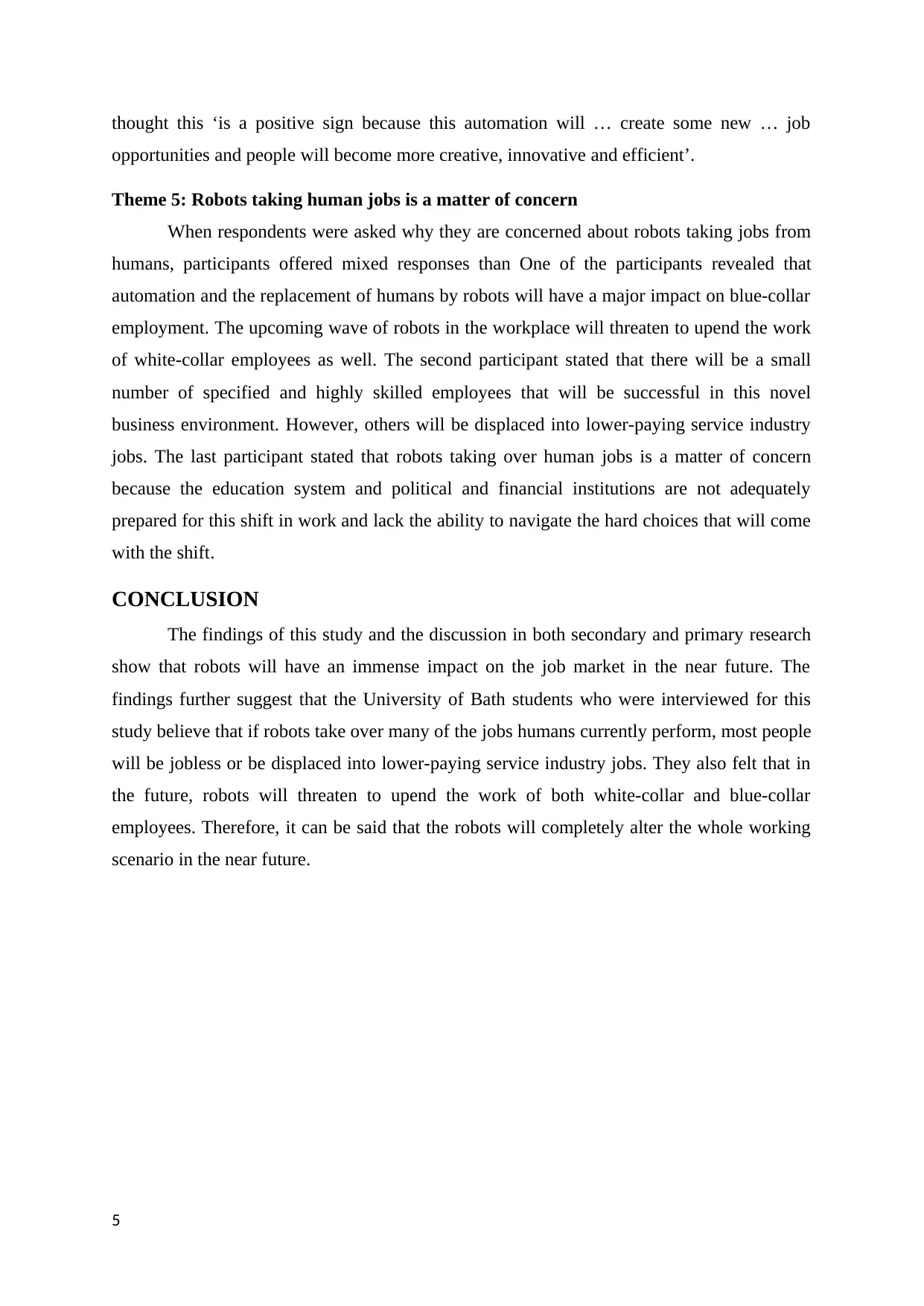
thought this ‘is a positive sign because this automation will … create some new … job
opportunities and people will become more creative, innovative and efficient’.
Theme 5: Robots taking human jobs is a matter of concern
When respondents were asked why they are concerned about robots taking jobs from
humans, participants offered mixed responses than One of the participants revealed that
automation and the replacement of humans by robots will have a major impact on blue-collar
employment. The upcoming wave of robots in the workplace will threaten to upend the work
of white-collar employees as well. The second participant stated that there will be a small
number of specified and highly skilled employees that will be successful in this novel
business environment. However, others will be displaced into lower-paying service industry
jobs. The last participant stated that robots taking over human jobs is a matter of concern
because the education system and political and financial institutions are not adequately
prepared for this shift in work and lack the ability to navigate the hard choices that will come
with the shift.
CONCLUSION
The findings of this study and the discussion in both secondary and primary research
show that robots will have an immense impact on the job market in the near future. The
findings further suggest that the University of Bath students who were interviewed for this
study believe that if robots take over many of the jobs humans currently perform, most people
will be jobless or be displaced into lower-paying service industry jobs. They also felt that in
the future, robots will threaten to upend the work of both white-collar and blue-collar
employees. Therefore, it can be said that the robots will completely alter the whole working
scenario in the near future.
5
opportunities and people will become more creative, innovative and efficient’.
Theme 5: Robots taking human jobs is a matter of concern
When respondents were asked why they are concerned about robots taking jobs from
humans, participants offered mixed responses than One of the participants revealed that
automation and the replacement of humans by robots will have a major impact on blue-collar
employment. The upcoming wave of robots in the workplace will threaten to upend the work
of white-collar employees as well. The second participant stated that there will be a small
number of specified and highly skilled employees that will be successful in this novel
business environment. However, others will be displaced into lower-paying service industry
jobs. The last participant stated that robots taking over human jobs is a matter of concern
because the education system and political and financial institutions are not adequately
prepared for this shift in work and lack the ability to navigate the hard choices that will come
with the shift.
CONCLUSION
The findings of this study and the discussion in both secondary and primary research
show that robots will have an immense impact on the job market in the near future. The
findings further suggest that the University of Bath students who were interviewed for this
study believe that if robots take over many of the jobs humans currently perform, most people
will be jobless or be displaced into lower-paying service industry jobs. They also felt that in
the future, robots will threaten to upend the work of both white-collar and blue-collar
employees. Therefore, it can be said that the robots will completely alter the whole working
scenario in the near future.
5
Paraphrase This Document
Need a fresh take? Get an instant paraphrase of this document with our AI Paraphraser
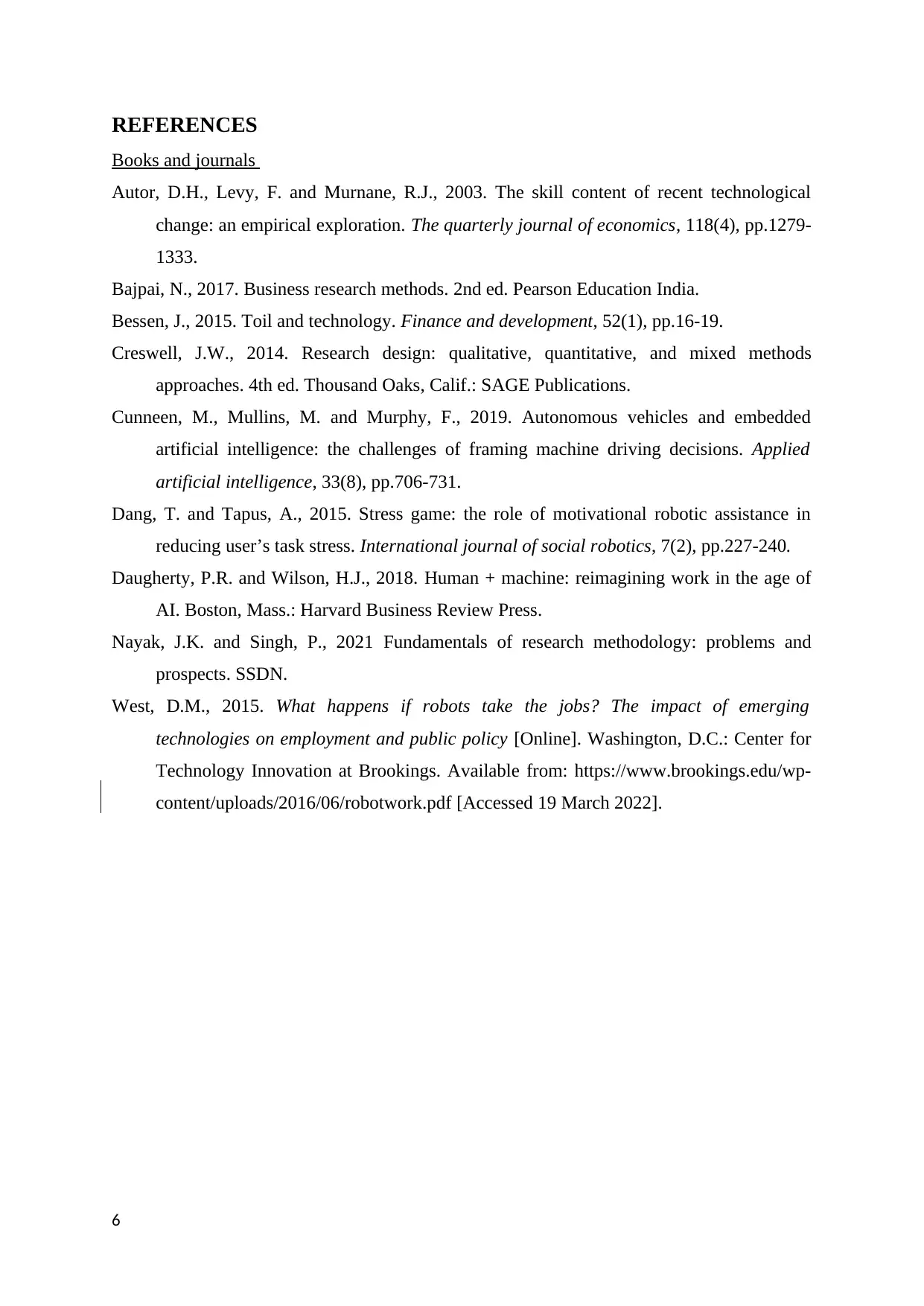
REFERENCES
Books and journals
Autor, D.H., Levy, F. and Murnane, R.J., 2003. The skill content of recent technological
change: an empirical exploration. The quarterly journal of economics, 118(4), pp.1279-
1333.
Bajpai, N., 2017. Business research methods. 2nd ed. Pearson Education India.
Bessen, J., 2015. Toil and technology. Finance and development, 52(1), pp.16-19.
Creswell, J.W., 2014. Research design: qualitative, quantitative, and mixed methods
approaches. 4th ed. Thousand Oaks, Calif.: SAGE Publications.
Cunneen, M., Mullins, M. and Murphy, F., 2019. Autonomous vehicles and embedded
artificial intelligence: the challenges of framing machine driving decisions. Applied
artificial intelligence, 33(8), pp.706-731.
Dang, T. and Tapus, A., 2015. Stress game: the role of motivational robotic assistance in
reducing user’s task stress. International journal of social robotics, 7(2), pp.227-240.
Daugherty, P.R. and Wilson, H.J., 2018. Human + machine: reimagining work in the age of
AI. Boston, Mass.: Harvard Business Review Press.
Nayak, J.K. and Singh, P., 2021 Fundamentals of research methodology: problems and
prospects. SSDN.
West, D.M., 2015. What happens if robots take the jobs? The impact of emerging
technologies on employment and public policy [Online]. Washington, D.C.: Center for
Technology Innovation at Brookings. Available from: https://www.brookings.edu/wp-
content/uploads/2016/06/robotwork.pdf [Accessed 19 March 2022].
6
Books and journals
Autor, D.H., Levy, F. and Murnane, R.J., 2003. The skill content of recent technological
change: an empirical exploration. The quarterly journal of economics, 118(4), pp.1279-
1333.
Bajpai, N., 2017. Business research methods. 2nd ed. Pearson Education India.
Bessen, J., 2015. Toil and technology. Finance and development, 52(1), pp.16-19.
Creswell, J.W., 2014. Research design: qualitative, quantitative, and mixed methods
approaches. 4th ed. Thousand Oaks, Calif.: SAGE Publications.
Cunneen, M., Mullins, M. and Murphy, F., 2019. Autonomous vehicles and embedded
artificial intelligence: the challenges of framing machine driving decisions. Applied
artificial intelligence, 33(8), pp.706-731.
Dang, T. and Tapus, A., 2015. Stress game: the role of motivational robotic assistance in
reducing user’s task stress. International journal of social robotics, 7(2), pp.227-240.
Daugherty, P.R. and Wilson, H.J., 2018. Human + machine: reimagining work in the age of
AI. Boston, Mass.: Harvard Business Review Press.
Nayak, J.K. and Singh, P., 2021 Fundamentals of research methodology: problems and
prospects. SSDN.
West, D.M., 2015. What happens if robots take the jobs? The impact of emerging
technologies on employment and public policy [Online]. Washington, D.C.: Center for
Technology Innovation at Brookings. Available from: https://www.brookings.edu/wp-
content/uploads/2016/06/robotwork.pdf [Accessed 19 March 2022].
6
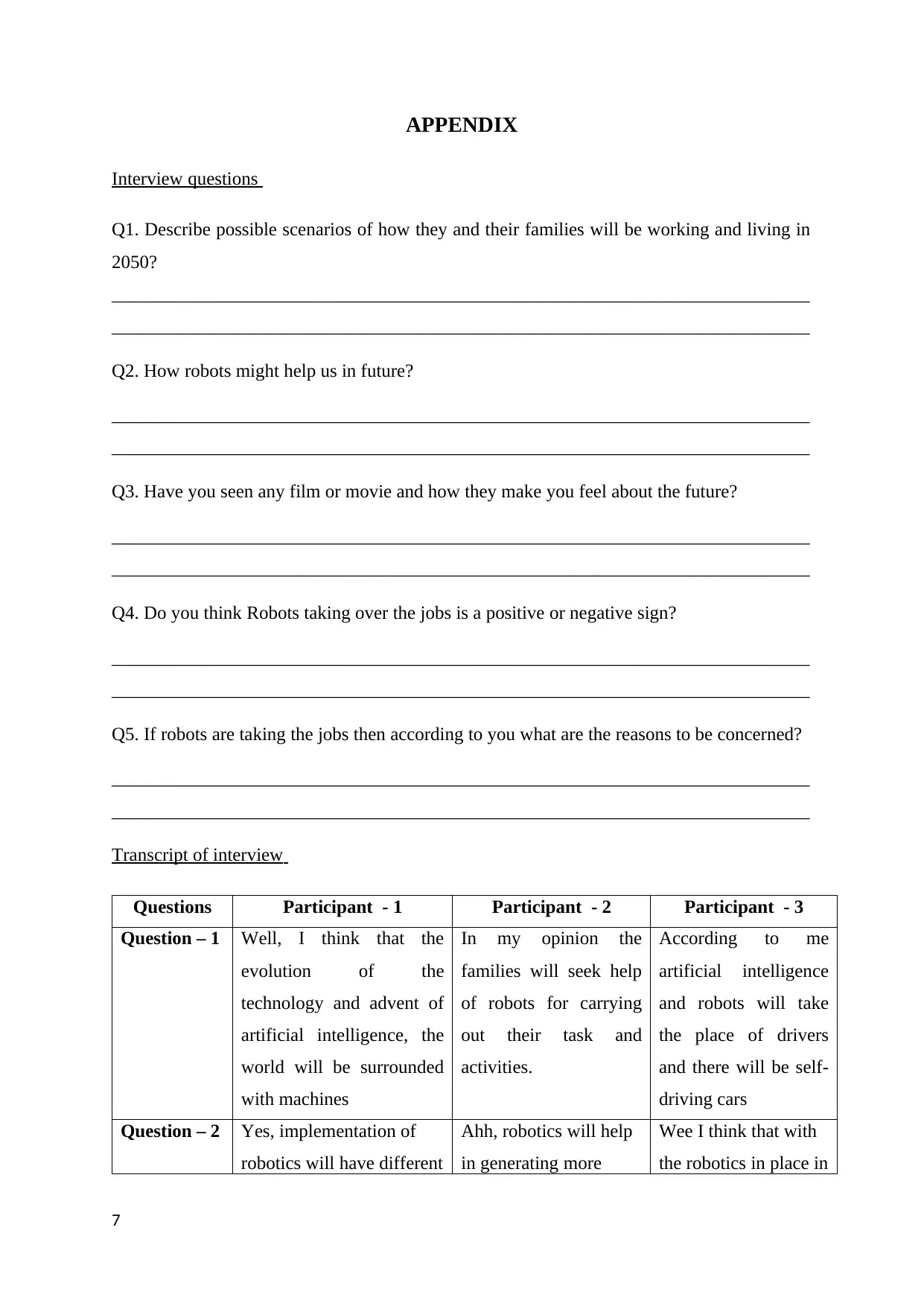
APPENDIX
Interview questions
Q1. Describe possible scenarios of how they and their families will be working and living in
2050?
___________________________________________________________________________
___________________________________________________________________________
Q2. How robots might help us in future?
___________________________________________________________________________
___________________________________________________________________________
Q3. Have you seen any film or movie and how they make you feel about the future?
___________________________________________________________________________
___________________________________________________________________________
Q4. Do you think Robots taking over the jobs is a positive or negative sign?
___________________________________________________________________________
___________________________________________________________________________
Q5. If robots are taking the jobs then according to you what are the reasons to be concerned?
___________________________________________________________________________
___________________________________________________________________________
Transcript of interview
Questions Participant - 1 Participant - 2 Participant - 3
Question – 1 Well, I think that the
evolution of the
technology and advent of
artificial intelligence, the
world will be surrounded
with machines
In my opinion the
families will seek help
of robots for carrying
out their task and
activities.
According to me
artificial intelligence
and robots will take
the place of drivers
and there will be self-
driving cars
Question – 2 Yes, implementation of
robotics will have different
Ahh, robotics will help
in generating more
Wee I think that with
the robotics in place in
7
Interview questions
Q1. Describe possible scenarios of how they and their families will be working and living in
2050?
___________________________________________________________________________
___________________________________________________________________________
Q2. How robots might help us in future?
___________________________________________________________________________
___________________________________________________________________________
Q3. Have you seen any film or movie and how they make you feel about the future?
___________________________________________________________________________
___________________________________________________________________________
Q4. Do you think Robots taking over the jobs is a positive or negative sign?
___________________________________________________________________________
___________________________________________________________________________
Q5. If robots are taking the jobs then according to you what are the reasons to be concerned?
___________________________________________________________________________
___________________________________________________________________________
Transcript of interview
Questions Participant - 1 Participant - 2 Participant - 3
Question – 1 Well, I think that the
evolution of the
technology and advent of
artificial intelligence, the
world will be surrounded
with machines
In my opinion the
families will seek help
of robots for carrying
out their task and
activities.
According to me
artificial intelligence
and robots will take
the place of drivers
and there will be self-
driving cars
Question – 2 Yes, implementation of
robotics will have different
Ahh, robotics will help
in generating more
Wee I think that with
the robotics in place in
7
⊘ This is a preview!⊘
Do you want full access?
Subscribe today to unlock all pages.

Trusted by 1+ million students worldwide
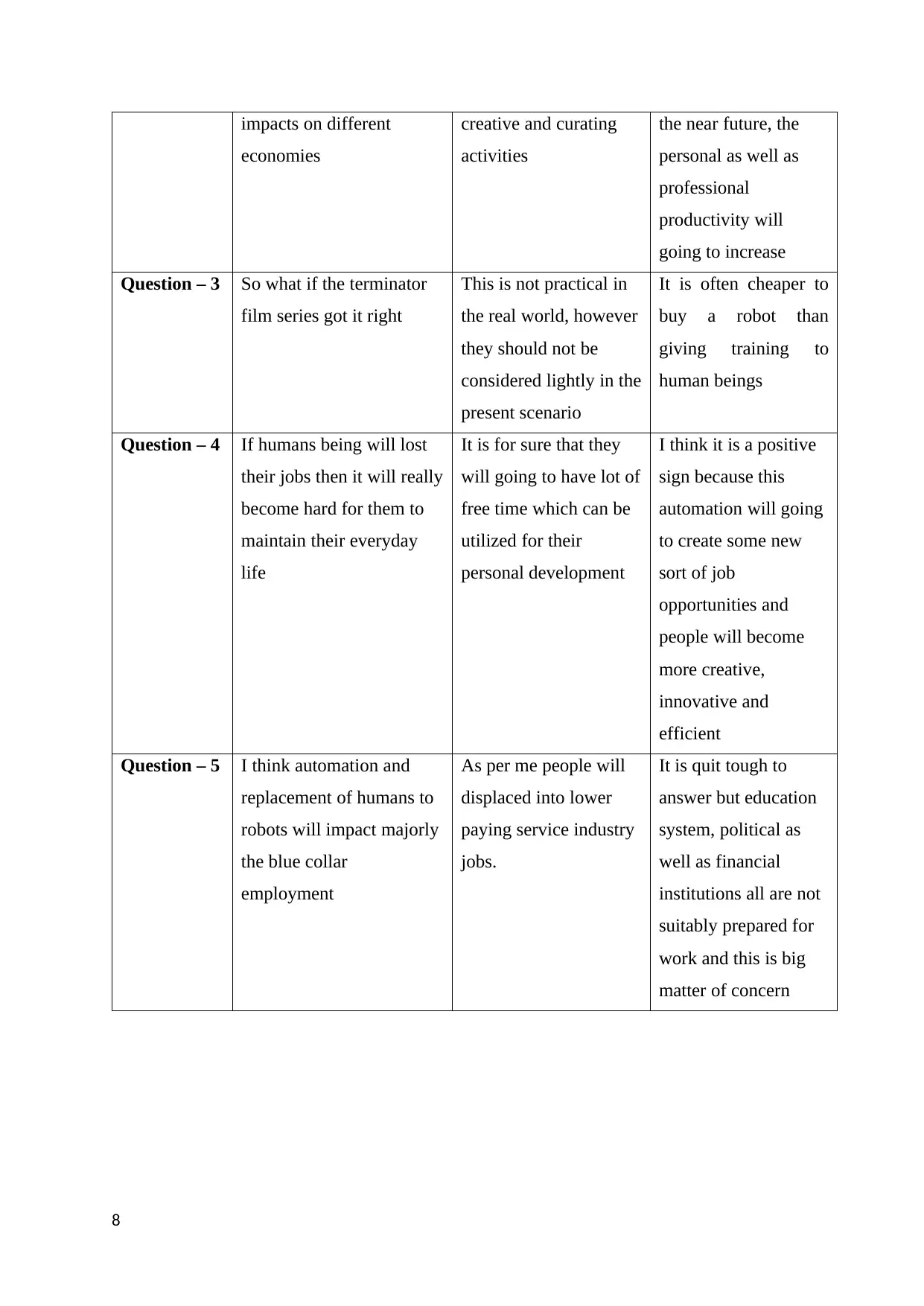
impacts on different
economies
creative and curating
activities
the near future, the
personal as well as
professional
productivity will
going to increase
Question – 3 So what if the terminator
film series got it right
This is not practical in
the real world, however
they should not be
considered lightly in the
present scenario
It is often cheaper to
buy a robot than
giving training to
human beings
Question – 4 If humans being will lost
their jobs then it will really
become hard for them to
maintain their everyday
life
It is for sure that they
will going to have lot of
free time which can be
utilized for their
personal development
I think it is a positive
sign because this
automation will going
to create some new
sort of job
opportunities and
people will become
more creative,
innovative and
efficient
Question – 5 I think automation and
replacement of humans to
robots will impact majorly
the blue collar
employment
As per me people will
displaced into lower
paying service industry
jobs.
It is quit tough to
answer but education
system, political as
well as financial
institutions all are not
suitably prepared for
work and this is big
matter of concern
8
economies
creative and curating
activities
the near future, the
personal as well as
professional
productivity will
going to increase
Question – 3 So what if the terminator
film series got it right
This is not practical in
the real world, however
they should not be
considered lightly in the
present scenario
It is often cheaper to
buy a robot than
giving training to
human beings
Question – 4 If humans being will lost
their jobs then it will really
become hard for them to
maintain their everyday
life
It is for sure that they
will going to have lot of
free time which can be
utilized for their
personal development
I think it is a positive
sign because this
automation will going
to create some new
sort of job
opportunities and
people will become
more creative,
innovative and
efficient
Question – 5 I think automation and
replacement of humans to
robots will impact majorly
the blue collar
employment
As per me people will
displaced into lower
paying service industry
jobs.
It is quit tough to
answer but education
system, political as
well as financial
institutions all are not
suitably prepared for
work and this is big
matter of concern
8
1 out of 10
Related Documents
Your All-in-One AI-Powered Toolkit for Academic Success.
+13062052269
info@desklib.com
Available 24*7 on WhatsApp / Email
![[object Object]](/_next/static/media/star-bottom.7253800d.svg)
Unlock your academic potential
Copyright © 2020–2025 A2Z Services. All Rights Reserved. Developed and managed by ZUCOL.



